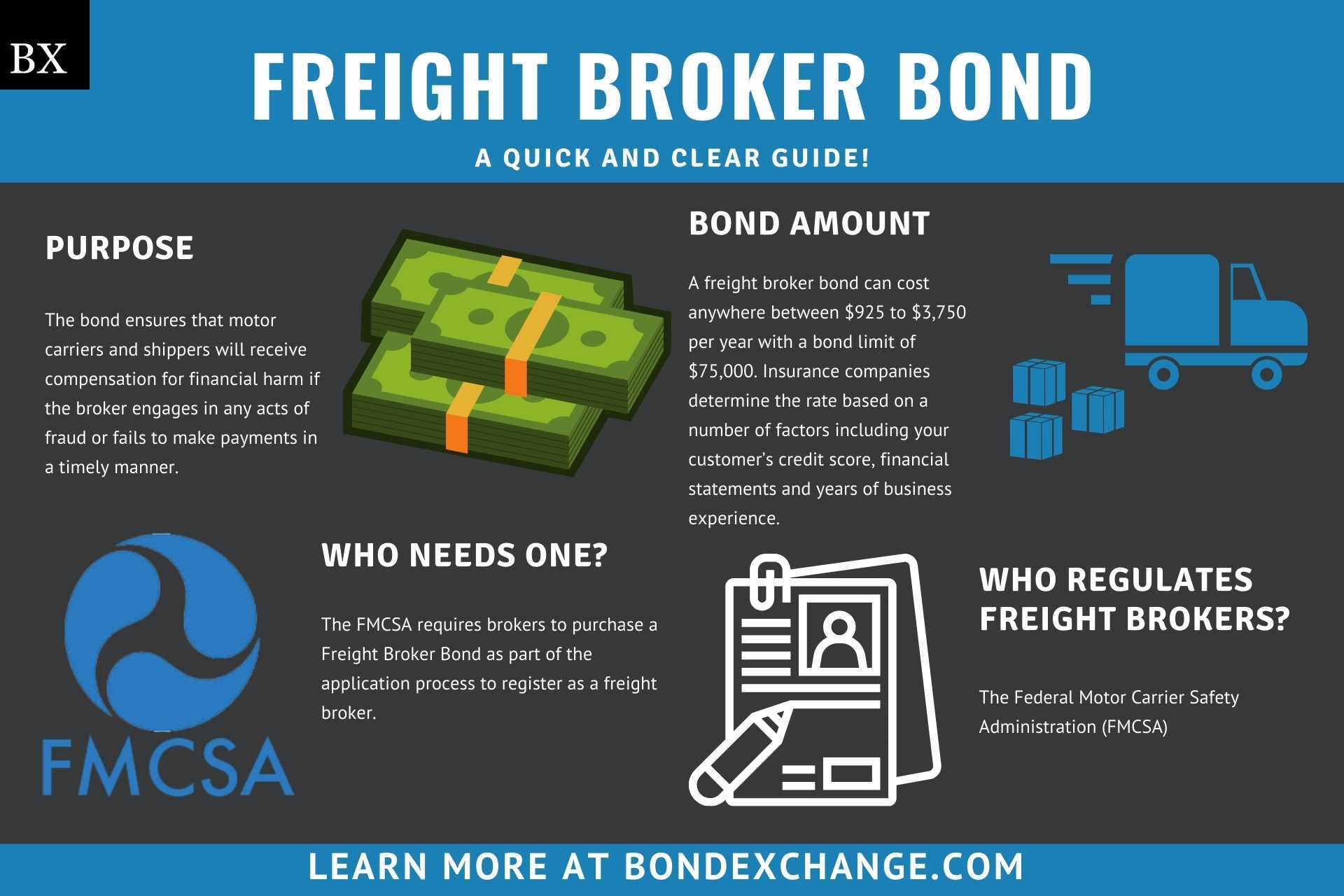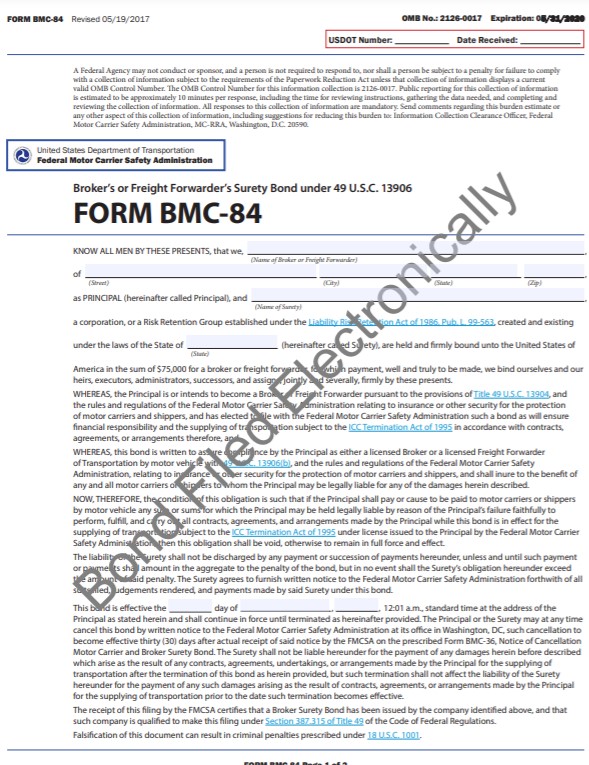BMC-84 Freight Broker Bond: A Comprehensive Guide
February 18, 2021

This guide provides information for insurance agents to help freight brokers on BMC-84 Freight Broker bonds
At a Glance:
- Average Cost: Between $925 to $9,750 per year based on the broker’s credit
- Bond Amount: $75,000
- Who Needs It: All individuals and business entities seeking to obtain a freight broker or freight forwarder registration
- Purpose: To ensure motor carriers and shippers do not suffer financial harm as a result of unethical actions committed by a freight broker
- Who Regulates Freight Brokers: The Federal Motor Carrier Safety Administration (FMCSA)
Background
49 U.S. Code Statute 13904 requires all freight brokers to register with the Federal Motor Carrier Safety Administration. Congress enacted the registration laws and regulations to ensure that brokers engage in ethical business practices and provide timely payment to their shippers. In order to provide financial security for the enforcement of the registration law, brokers must purchase and maintain a $75,000 freight broker surety bond (BMC-84) or obtain a trust fund agreement (BMC-85) to be eligible for registration.
What is the Purpose of a Freight Broker Bond?
The FMCSA requires brokers to purchase a Freight Broker Bond as part of the application process to register as a freight broker. The bond ensures that motor carriers and shippers will receive compensation for financial harm if the broker engages in any acts of fraud or fails to make payments to their carriers/shippers in a timely manner. In short, the bond is a type of insurance that protects motor carriers and shippers if the broker acts unethically.

How Can an Insurance Agent Obtain a Freight Broker Surety Bond?
BondExchange makes obtaining a Freight Broker Bond easy. Simply login to your account and use our keyword search to find the “freight” bond in our database. Don’t have a login? Enroll now and let us help you satisfy your customers’ needs. Our friendly underwriting staff is available by phone (800) 438-1162, email or chat from 7:30 AM to 7:00 PM EST to assist you.
At BondExchange, our 40 years of experience, leading technology, and access to markets ensures that we have the knowledge and resources to provide your clients with fast and friendly service whether obtaining quotes or issuing bonds.
What are the Underwriting Requirements for Freight Broker Bonds
Freight Broker bonds are considered higher risk bonds due to historical losses sustained by surety companies. As a result, underwriters will examine factors such as the broker’s personal credit score, financial statements, and years of business experience when determining the premium rate. Brokers with excellent credit and business experience can expect to receive the best rates. Brokers with poor credit may have to pay higher premium rates or could potentially be declined by more conservative surety companies.
How Much Does a BMC-84 Freight Broker Bond Cost?
A freight broker bond can cost anywhere between $925 to $9,750 per year. Insurance companies determine the rate based on a number of factors including your customer’s credit score, financial statements and years of business experience. In some cases, new brokers with very challenged credit may have to put up collateral or pay even higher premium rates.
Who is Considered a Freight Broker?
49 CFR Statute 371.2 defines a freight broker as any individual or business entity “who, for compensation, arranges, or offers to arrange, the transportation of property by an authorized motor carrier.” Motor carriers and their employees are not considered to be freight brokers.
Do Freight Forwarders Need a Bond?
The FMCSA requires all freight forwarders to purchase a $75,000 Freight Broker Bond. A freight forwarder is a business entity who organizes the shipping of property for motor carriers, as well as stores their customer’s property when needed. Freight forwarders are also authorized to handle international shipments.
How Do Freight Brokers Register with the FMCSA?
Freight brokers must navigate several steps to secure their registration. Below are the general guidelines, but brokers should refer to the application form for details on the process.
Registration Period – The freight broker registration is valid for no longer than 5 years from the date of issuance. However, the FMCSA has the authority to shorten the registration period for individual brokers.
Step 1 – Purchase a Surety Bond or Obtain a Trust Fund Agreement
Freight brokers must purchase and maintain a $75,000 BMC-84 Freight Broker surety bond or obtain a trust fund agreement.
Step 2 – Purchase Insurance
The FMCSA requires freight forwarders to purchase both public liability and cargo insurance with the following minimum limits:
-
- Public Liability Insurance
- Freight: Between $750,000 – $5,000,000, depending on the type of property transported; $300,000 for non-hazardous freight moved only in vehicles weighing under 10,001 lbs.
- Passengers: $5,000,000; $1,500,000 for brokers solely operating vehicles with seating capacity of 15 or fewer passengers
- Cargo Insurance
- $5,000 per vehicle
- $10,000 per occurrence
- Public Liability Insurance
Step 3 – Designate a Process Agent
Brokers must designate a process agent for each state where they have office space or write contracts. A process agent is essentially a legal representative of the freight broker who can be served court papers in any legal proceedings brought against the broker. A freight broker may designate himself or herself as the process agent in the state they reside. Process agents will need to mail a completed BOC-3 form to the following address:
FMCSA
Office of Registration and Safety Information, MC-RS
1200 New Jersey Avenue SE
Room W65-206
Washington, DC 20590
Step 4 – Complete the Application
All regulatory freight broker registration applications should be completed online through the FMCSA’s registration portal. Brokers must complete the entire application and submit a $300 application processing fee.
How Does a Freight Broker Renew Their Registration?
Freight brokers must mail their completed renewal application, including a $300 operating fee, to the following address:
Federal Motor Carrier Safety Administration
1200 New Jersey Avenue
SE Room W65-206
Washington, DC 20590
The freight broker registration is valid for no longer than 5 years from the date of registration. However, the FMCSA has the authority to shorten the registration period for individual brokers.
What are the Differences Between a Freight Broker Surety Bond (BMC-84) and a Trust Fund Agreement (BMC-85)?
Brokers who choose to obtain a BMC-85 Trust Fund Agreement must offer the full $75,000 in collateral, or place this amount in a trust, when applying for registration. Banks and trust companies will generally charge an annual fee of 1-2% to maintain the trust. Brokers who obtain the BMC-84 surety bond do not need to offer the bond amount in collateral, but instead must pay an annual premium on the bond. Unlike trust fund agreements, surety bonds do not diminish the broker’s working capital by tying up assets in a trust or collateral. Agents can learn more about the differences between surety bonds and trust fund agreements here.
What Are the Insurance Requirements for Freight Brokers?
The FMCSA requires freight forwarders to purchase both general liability and cargo insurance with the following minimum limits:
- Public Liability Insurance
- Freight: Between $750,000 – $5,000,000, depending on the type of property transported; $300,000 for non-hazardous freight moved only in vehicles weighing under 10,001 lbs.
- Passengers: $5,000,000; $1,500,000 for brokers solely operating vehicles with seating capacity of 15 or fewer passengers
- Cargo Insurance
- $5,000 per vehicle
- $10,000 per occurrence
In addition, freight brokers and freight forwarders must purchase and maintain a $75,000 Freight Broker surety bond or obtain a trust fund agreement.
How Is the BMC-84 Freight Broker Bond Filed with the FMCSA?
The surety company that issues the BMC-84 Freight Broker Bond must file the bond electronically with the FMCSA. Once the bond has been purchased, the surety company will submit the electronic bond through the FMCSA portal. The filed bond and other insurance requirements can be viewed using the FMCSA insurance lookup tool or through the registration portal.
What Can Brokers Do to Avoid Claims Against the Freight Broker Bond?
To avoid claims on the Freight Broker Bond, brokers must follow all regulations set forth by the FMCSA, including some of the most important issues below that tend to cause claims:
- Do not engage in, or allow representatives of your business to engage in, any acts of fraud
- Pay all motor carriers and shippers on time and in full
Freight Broker’s should note that claims can only be filed against their bond for interstate loads (traveling across state lines). Additionally, to avoid claims brokers should ensure each shipment has a verified contract confirming the shipment price. If any changes to the shipment price are made they should be well documented. Lastly, the FMCSA does not regulate the transportation of certain agricultural commodities per 49 U.S.C. 13506(a)(6)(D). Motor carriers who ship any of the agricultural products referenced in this statute will not be able to seek reimbursement via the broker’s surety bond or trust fund.
What Other Insurance Products Can Agents Offer Freight Brokers?
The FMCSA requires freight brokers to purchase both general liability and cargo insurance. Bonds are our only business at BondExchange, so we do not issue liability or cargo insurance, but our agents often utilize brokers for this specific line of business. A list of brokers in this space can be found here.
How Can Insurance Agents Prospect for Freight Broker Customers?
The FMCSA conveniently provides a public database to search for active freight brokers. The database can be accessed here. Contact BondExchange for additional marketing resources. Agents can also leverage our print-mail relationships for discounted mailing services.

